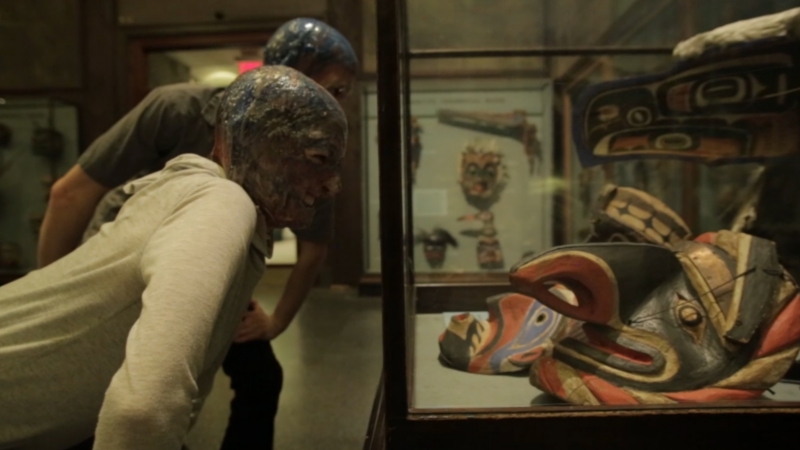Filmmaker Adam Khalil has co-curated a series of short films that looks at ethnography through the lens of fetishism and violence. The selection of shorts range from fourteen seconds to fourteen minutes in length, with films from as far back as 1894 and as recent as 2017. The screening features a variety of filmmakers who look at indigenous people and cultures and in total features fourteen different films at a sold-out event at the Glasgow Short Film Festival 2019.
The evening begins with one of the earliest examples of the moving image with Sioux Ghost Dance (1894) by W.K.L. Dickson and Thomas Edison. A beating drum soundtracks a short repeated dance sequence from Buffalo Bill’s Wild West Exhibition. The repetition and the presentation of the dance create a sequence that looks staged and overplayed and suggests manipulation and falsification. This theme is carried on with the short film Welcome to the Third World (2004) by Mexican performance artist Guillermo Gómez-Peña. This short plays with the fetishisation of identity. Instant Identity Ritual (2007) and Bizarre Thanksgiving Performance Ritual (2013) (both directed by Gómez-Peña and Gustavo Vázquez) again underline these themes, with Gómez-Peña talking directly to the camera and toying with humour, comedy and representation.
The evening’s programme is peppered with short segments from comedian Tonia Jo Hall. She has created a character called Auntie Beachress who films rants on her mobile phone. Are You Looking at Me?, Lakota Language Challenge, Only Boring People Get Bored and Life Struggles (all created in 2015), all pop up during the screening, where we experience short comedic outbursts from a loud and bombastic character.
WAWA (2014) from director Sky Hopinka looks at Native American language and words. The short contains interviews with speakers of Chinuk Wawa from the Pacific Northwest. As the interviewees talk, their language becomes more difficult to translate and miscommunication comes across in the subtitling of the words. It is an interesting piece of ethnography that uses interviews and voice-overs to great effect. A standout in the screening is the New York Times documentary Native Fantasy: Germany’s Indian Heroes (2014) which is directed by Axel Gerdau, Erik Olsen and John Woo. The short documentary looks at how Native American culture has found its way to rural Germany through elaborate stage productions that take place every year. The documentary looks at how Germany has appropriated Native American stories and acquired artefacts for local museums. The inclusion of certain items is against the traditions of Native American culture and this causes a conflict that is yet to be resolved. The Violence of a Civilisation Without Secrets (2017) from Adam Khalil, Zack Khalil, and Jackson Polys is another documentary that presents ideas on identity and tradition. In the 1990s, a human skull was discovered on Native American land which put into question who the traditional occupiers of the land were. The film presents how history can be re-written in order to satisfy powerful people.
With such a wide array of films within the programme, it is difficult at times to keep track of all the themes and topics that are presented. The Anti-Ethnography screening bestows many ideas and identities and showcases how manipulative and powerful the moving image can be.
